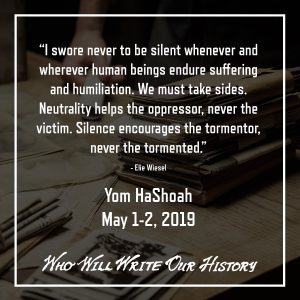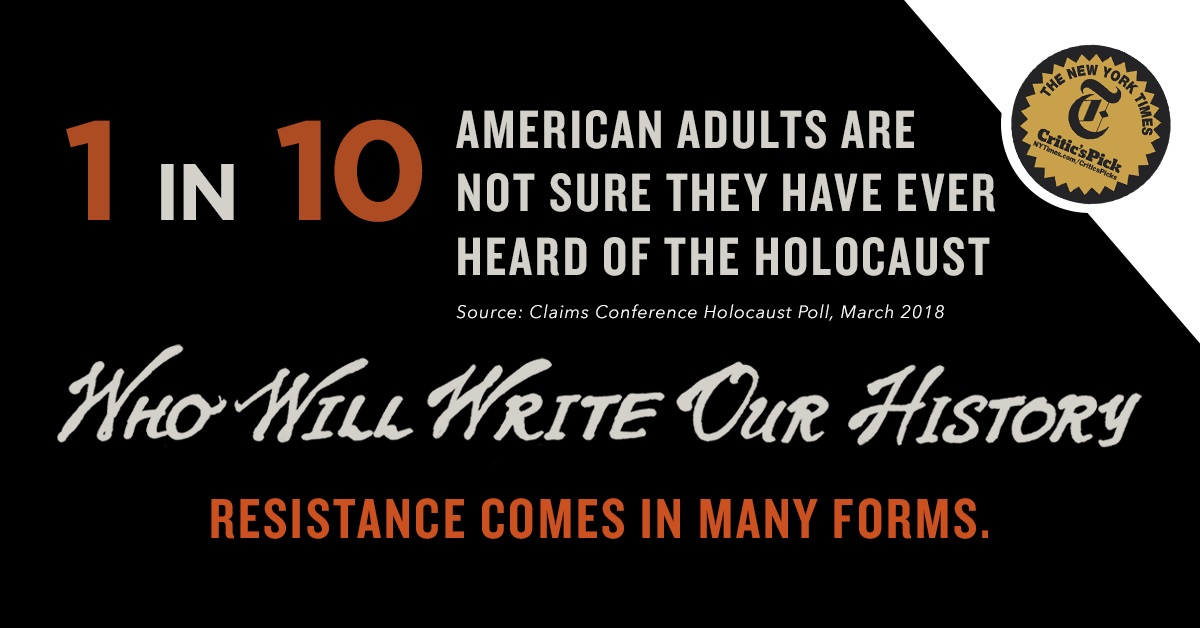Gallery with alias: PUBLIC_HISTORY_BLOG_POSTS not found
It’s the kind of modern history lesson that makes you glance sideways at the world while shaking your head, exclaiming,
“Wow, I didn’t know that!”
“Why didn’t they ever teach us this stuff in school?”
It’s a common reaction to mind blowing revelations and new learnings about our past that public historians are pleased to hear in the halls of their museums.
“You didn’t know about this?” asks the history tour guide.
“No, I did not know this,” responds the museum visitor, shaking her head.
We can insert just about any interesting history moment into this scenario, from the world stage to our local neighborhoods, and the reactive moment suggests that public historians are never done telling history’s story to new audiences.
Take for example the Holocaust, exhaustively covered by academic and public historians for more than 80+ years. Yet, according to a 2018 study by the Claims Conference:
While there were over 40,000 concentration camps and ghettos in Europe during the Holocaust, almost half of Americans (45 percent) cannot name a single one – and this percentage is even higher amongst Millennials.
Nearly half of all Americans — 41 percent — couldn’t identify Auschwitz, a concentration camp where an estimated 1.1 million Jews and minorities were killed at the hands of Nazis during World War II. Among millennials, that number rose to 66 percent.
These revelations about our collective historical ignorance—of modern history, no less—are shocking. “Wow, we didn’t know that!”—to which public historians and history educators might respond, “We’ve been warning about this crisis for years.”
Greg Schneider, Executive Vice President of the Claims Conference, states, this Holocaust awareness study “underscores the importance of Holocaust education in our schools . . . There remain troubling gaps in Holocaust awareness while survivors are still with us; imagine when there are no longer survivors here to tell their stories. We must be committed to ensuring the horrors of the Holocaust and the memory of those who suffered so greatly are remembered, told and taught by future generations.”
“The stories a society tells about itself,” writes noted educational theorist Henry Giroux, “are a measure of how it values itself.” When it comes to history, Giroux contends, “America has become amnesiac, a country in which forms of historical, political, and moral forgetting are not only willfully practiced but celebrated.”
According to the Claims Conference study, 41 percent of millennials believe that two million or less Jewish people were killed during the Holocaust. It’s commonly estimated that as many as six million Jews died in the Holocaust.
Historians tell us that during the 1930s and 40s, people thought the kind of mass murders perpetrated during the Holocaust were inconceivable.
42 % of Americans believe something like the Holocaust could never happen again.
Despite the testimony of eye witness accounts and an abundance of documented historical evidence, people are still forgetting history. In fact, they’re continually dumbfounded by it.
WHO WILL TEACH OUR HISTORY
As public historians, we contend that responsibility for Holocaust history education—in fact, all history education—should and must extend beyond classrooms and schoolbooks. We learn history from other pedagogical spaces and activities: during church services, around the family dinner table, in coffee shops and bars, at political rallies, and through media.
Generally speaking, perhaps no other history teacher is more impactful on our lives than popular culture—where most of us learn about life from movies, music, television, video games, sports, news, politics, technology, etc.
Popular culture is pedagogical; it teaches, instructs, and shapes our values through an ad mixture of fact, fiction, reality, mythos, memory, and money. Popular culture teaches us what matters most (i.e., has value): what’s current, present, trending, wealthy, beautiful, and glimmering in the spotlight. Everything else is old news, yawning fashion trends, slipping pop songs on the charts, fading celebrity movies.
HOLLYWOOD HISTORY
By definition history is old news, so how does popular culture handle it? Through story, of course. When pop culture “does history,” it’s through imaginative, exciting, and fascinating storytelling. Hollywood history is compelling, dramatic, grand, and heroic.
However, pop culture history tends to be abridged; there are no scholarly footnotes and academic complexities to get in the way of great storytelling. It is also formulaic, conforming to the grammatical rules we know and expect from entertainment—especially if we’re paying for it at the box office or by streaming download subscription.
Nevertheless, we can’t discount or undervalue the reach, excitement, and impact of Hollywood history. Think of what we know about history from Roots, Ghandi, JFK, Apollo 13, Lawrence of Arabia, Gladiator, Braveheart, All the President’s Men, 12 Years a Slave, Born on the Fourth of July, Saving Private Ryan, and Shindler’s List.
And now, in reaction to the tro ubling revelations about Holocaust history awareness brought to light by Claims Conference and others, there is a new history film that shares a particularly interesting and untold story about the Holocaust—one of resistance, defiance, and hope against all odds: Who Will Write Our History.
ubling revelations about Holocaust history awareness brought to light by Claims Conference and others, there is a new history film that shares a particularly interesting and untold story about the Holocaust—one of resistance, defiance, and hope against all odds: Who Will Write Our History.
In November 1940, days after the Nazis sealed 450,000 Jews in the Warsaw Ghetto, a secret band of journalists, scholars and community leaders decided to fight back. Led by historian Emanuel Ringelblum and known by the code name Oyneg Shabes, this clandestine group vowed to defeat Nazi lies and propaganda not with guns or fists but with pen and paper. Now, for the first time, their story is told as a feature documentary. Written, produced, and directed by Roberta Grossman and executive produced by Nancy Spielberg, Who Will Write Our History mixes the writings of the Oyneg Shabes archive with new interviews, rarely seen footage and stunning dramatizations to transport us inside the Ghetto and the lives of these courageous resistance fighters. They defied their murderous enemy with the ultimate weapon – the truth – and risked everything so that their archive would survive the war, even if they did not.
We should be so blessed if this film is widely seen and talked about. If it inspires debates over factual accuracy and historiography (as so many Hollywood history films have), we should welcome the opportunity to discuss and set the record straight, using pop culture’s powerful platform to educate, entertain, and inspire people to be more actively engaged in history learning.
Director Roberta Grossman states the case this way:
Which side of the story becomes the official narrative? Whose accounts do we elevate to the level of “truth,” and whose do we ignore or even bury? What is real, and what is fake? These are top-of-mind questions in 2018. They also preoccupied a courageous group of resistance fighters imprisoned in the Warsaw Ghetto in World War II. The moment I found out about this secret band of journalists, scholars, and historians, I knew I had to make a film about them. Their story, captured in Who Will Write Our History, is, in my opinion, the most important unknown story of the Holocaust.
CONNECTING WITH LOCAL HISTORY
We hope local historical societies and museums will be foresighted enough to connect this film to their own historical programs. Who Will Write Our History reminds us that survivors of the Holocaust and the WWII era are still alive in our communities. Many are very aged and frail, but they remain willing and able to tell their stories.
As public historians, we believe these stories are worth preserving through community-based oral history projects. Local historical societies and museums are uniquely positioned to carry out this work. They can and should serve as centers of living history, capturing, preserving, and sharing these stories with their communities—especially our younger generations.
The Social Voice Project specializes in producing oral history projects
in partnership with local historical societies, museums, and nonprofit organizations
Here is an oral history interview we produced with 96 year old Andrew Madeyski of Natrona Heights, Pennsylvania, Polish immigrant and veteran of the Warsaw Uprising.
This post is inspired by the film, Who Will Write Our History, written, produced, and directed by Roberta Grossman.
PUBLIC HISTORY MATTERS
At The Social Voice Project, we celebrate history and people through our community oral history projects that give us a chance to look, listen, and record the voices and stories of our time. We encourage all local historical societies and museums to capture, preserve, and share their communities’ lived experiences, memories, customs, and values. Future generations are depending on it.
Contact TSVP to learn more about our commitment to public history and community oral history projects.


You must be logged in to post a comment.